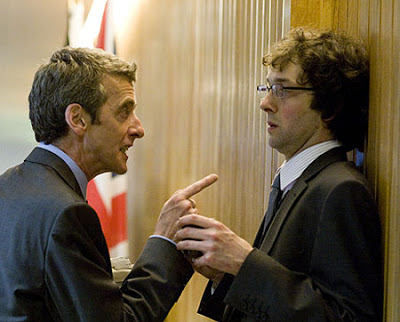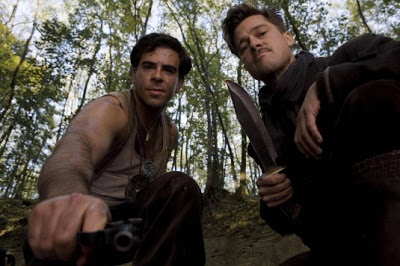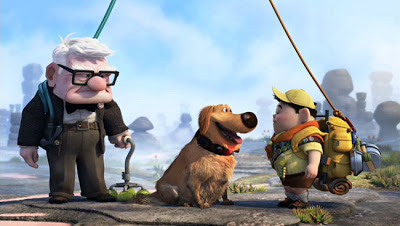Now we’re getting somewhere. Having dispensed with the technical categories (in somewhat brisk fashion, I might add), we now move on to what I call the “Big Eight”. Why? Because they’re big – as in important – and there are eight of them. But seriously, while I concede that the majority of film fans aren’t particularly interested in fields such as Sound Editing and Art Direction, I’ll posit that even casual moviegoers may hold a vested interest in the winners of the Big Eight. First up are the screenplays (adapted and original), and they present quite a contrast this year, at least in terms of predicting the winner. One category features a surefire champion, while the other represents the most intriguing competition of all of Oscar-night.
Before I get to the analysis, I want to introduce a new feature of the Manifesto, unique to the Big Eight, called “My Ideal Ballot”. Loyal readers (hi Dad!) will know that in addition to the standard “Will Win” and “Should Win” analyses, I generally include a “Deserving” section, where I enumerate other high-quality contenders that failed to receive a nomination. I’ll continue on that tack, but with “My Ideal Ballot”, I’ll be limiting myself to five choices (including the actual nominees). The theoretical goal is answer a simple hypothetical: If I were an Academy member, what/whom would I nominate? It’s relatively easy to excoriate Oscar voters for their poor cinematic judgment, but I imagine it will be somewhat more difficult to place similar restrictions on my own analysis. We shall see.
Alright, let’s get to it.
BEST ADAPTED SCREENPLAY
District 9 – Neill Blomkamp & Terri Tatchell
An Education – Nick Hornby
In the Loop – Jesse Armstrong, Simon Blackwell, Armando Iannucci, & Tony Roche
Precious – Geoffrey Fletcher
Up in the Air – Jason Reitman & Sheldon Turner
WILL WIN
Most years, this category features the heavy hitters (four of the five Best Picture nominees of 2008 also fought it out for the Adapted Screenplay prize), but that isn’t exactly the case in 2009. In fact, half of the 10 films nominated for Best Picture this year are wholly original creations. Does this mean that modern screenwriters are becoming more inventive and less reliant on preexisting material? Probably not, but it’s an appealing thought.
Of course, given that we’re dealing with 10 Best Picture nominees this year, this category still finds room for four. The exception is the scathingly satiric screenplay for In the Loop, and while it’s tempting to rule it out immediately given its lack of overall recognition (this is its sole nomination), I can’t be quite so hasty. The writing in In the Loop is easily its greatest asset, exhibiting the incisive, whip-smart dialogue toward which Oscar voters tend to gravitate. I don’t think it will win, mind you, but it can’t be dismissed out of hand.
The same can’t be said for District 9, which will receive more attention for its allegorical treatise and special effects than its writing. I’ll also throw out An Education, which feels to me like more of an actors’ picture, despite Nick Hornby being the lone nominee who possesses name recognition.
That leaves Precious and Up in the Air, the two nominees who also received nods in the Best Director category. (Remember, now that Best Picture has expanded to a decathlon, we turn to Best Director to determine the top dogs.) Given that similarity, you might think this is a close race. It isn’t. Up in the Air‘s star has dimmed significantly in the Best Picture race since its premiere in Toronto, but Reitman and Turner have been nothing short of dominant on the screenplay circuit. The frequent flier film racks up some more mileage.
SHOULD WIN
It’s difficult for me to evaluate this category properly, and for one very simple reason: I don’t read. Like, ever. (Seriously, the last Adapted Screenplay nominee with whose source material I was familiar was Before Sunset in 2004, and that’s only because it was based on its own movie. Prior to that, you’d have to go back to The Lord of the Rings: The Return of the King in 2003. Anyway.) In my mind, an adapted screenplay’s worth cannot be determined in a vacuum; the key component is how effectively the writer extracts key themes from the source and translates those elements to the screen. Culling subplots, altering dialogue, adding or subtracting characters – these are the true tests of movie adaptations.
But as a result of my self-imposed illiteracy, I have no choice but to evaluate these five nominees based solely on what I see on the screen. And while the other three screenplays are perfectly serviceable, for me this comes down to a surprisingly close contest between In the Loop and Up in the Air. I say “surprisingly” because In the Loop‘s primary focus is the lampooning of politics, and while I consider myself an expert on a few things, politics is not one of them. But a familiarity (or even a vague interest) in the inner machinations of the political world isn’t required to appreciate the manner in which In the Loop eviscerates its targets with such ferocious causticity. A sharp-witted, delightfully profane monstrosity, the movie is both keenly intelligent and mercilessly funny.
One facet its screenplay does not feature, however, is depth of character, an element that is crucial to Jason Reitman’s and Sheldon Turner’s brilliantly nuanced screenplay for Up in the Air. Its premise almost sounds clichéd – a seemingly cold-hearted corporate axe-man discovers what’s important in life – but it proceeds with both warmth and shading, generously adding dimensionality to all of its major characters, and a few of its minor ones. The dialogue is satisfactorily snappy, but it’s through the moments of silence – such as a devastating phone call near its conclusion – that the movie achieves its true power. I can’t vouch for the quality of the novel on which the film is based, but from a cinematic standpoint, Up in the Air represents the pinnacle of screenwriting in 2009.
MY IDEAL BALLOT
Harry Potter and the Half-Blood Prince – Steve Kloves
In the Loop – Jesse Armstrong, Simon Blackwell, Armando Iannucci, & Tony Roche
The Informant! – Scott Z. Burns
State of Play – Matthew Michael Carnahan, Tony Gilroy, & Billy Ray
Up in the Air – Jason Reitman & Sheldon Turner
Comments: Is it me, or is this a really weak group? I’m comfortable sliding in The Informant!, with its devilish structure and unreliable narrator, not to mention one of the few interesting voiceovers in recent memory. But I’ll concede that my next two choices are stretches. That said, I commend Steve Kloves for his shrewd decision-making that helped transform the sixth Harry Potter installment from an ostensible prelude on the page to a gripping coming-of-age journey on the screen. For State of Play, Carnahan, Gilroy, and Ray were charged with condensing a remorselessly detailed six-hour BBC miniseries into a standard-length Hollywood thriller, and they effectively maintained the sweeping scope of the original while also appending a valentine to the dying newspaper industry.
Still, given that I struggled mightily just to come up with five adapted screenplays deserving of Oscar consideration, I think it’s safe to say that this was a weak year for the category. Fortunately we have …
ORIGINAL SCREENPLAY
The Hurt Locker – Mark Boal
Inglourious Basterds – Quentin Tarantino
The Messenger – Alessandro Camon & Oren Moverman
A Serious Man – Joel Coen & Ethan Coen
Up – Bob Peterson, Pete Docter, & Thomas McCarthy
WILL WIN
And at last, intrigue! O.K., we’re dumping The Messenger immediately, and I’m reasonably comfortable eliminating A Serious Man and Up as well in spite of their Best Picture nominations. But the duel between Inglourious Basterds and The Hurt Locker is about as much of a toss-up as you can get – the photo finish in Seabiscuit wasn’t this close. In the Basterds‘ corner, we have the man himself, Quentin Tarantino, whose name is synonymous with originality. Now, cynics frequently accuse the Academy of being overly middlebrow when bequeathing its major honors, but it tends to branch out a bit in this category (past winners this decade include Juno, Little Miss Sunshine, and Eternal Sunshine of the Spotless Mind), and Basterds sports the kind of nervy audacity that might appeal to the voters’ more daring side.
For its part, The Hurt Locker is far from conventional; in fact, you could argue that its screenplay – which steadfastly refuses to follow a traditional narrative arc – is even more atypical than that of Basterds. Perhaps more importantly, it’s the consensus favorite for Best Picture, and that grants it some lengthy coattails (the winner of the top prize has also claimed victory for its screenplay in five of the past six years).
For no particular reason, I imagine that voters here are fighting an internal debate with themselves: They want to vote for Inglourious Basterds on the merits of its screenplay, but they also believe The Hurt Locker is the better film overall and are thus debating whether that superiority should trickle down to this category. If that theory is correct – and there’s absolutely no evidence that it is – then Basterds really should take the trophy (at least in the minds of the members), but there’s always the possibility that the voters outthink themselves.
Who wins out? I have a particularly irksome habit of giving the Academy too much credit – always a bad idea – but if there’s a category in which I can be optimistic, it’s this one. (Of course, that’s what I said last year when I predicted that Wall-E would defeat Milk. Whoops.) And so, with minimal confidence, I’m declaring that the members will actually vote with their Nazi-hating hearts and go with Inglourious Basterds. And now that I’ve given myself a migraine by attempting to peer into the subconscious of an imaginary Academy member, I’d like to move on. Thanks.
SHOULD WIN
Oddly enough, while I admire all of these screenplays, I can’t profess undying love for any of them. The first half of The Messenger is terrific, but it goes AWOL in its final passages. Similarly, The Hurt Locker‘s story becomes strained once it attempts to follow a centralized plot that unfortunately lacks punch. The writing in A Serious Man is half-brilliant, half-pretentious (anyone who can adequately explain the meaning of its opening scene and how it ties into the rest of the film, please do so in the Comments). Inglourious Basterds is awesomely entertaining, or at least it would be if Tarantino didn’t indulge himself so egregiously, resulting in some agonizingly lengthy scenes (this movie earned an editing nomination?). And while the story in Up is for the most part splendidly original, it settles a bit too comfortably into standard action fare as it journeys toward its conclusion.
Then again, it’s somewhat erroneous to apply the word “standard” to a film whose action scenes involve a floating house, a dirigible piloted by dogs, and a multi-colored tucan-esque bird that loves chocolate. Throw in the fact that it’s both heartwarming and hilarious (let’s not forget this spectacular scene), and Up is on the up-and-up.
MY IDEAL BALLOT
(500) Days of Summer – Scott Neustadter & Michael H. Weber
Adventureland – Greg Mottola
Duplicity – Tony Gilroy
Funny People – Judd Apatow
Up – Bob Peterson, Pete Docter, & Thomas McCarthy
Comments: Much better. I’m a bit surprised that my favorite original screenplays of the year all have a comedic slant to them – perhaps dramas are more likely to be harvested from existing material, whereas comedies are freshly written. Regardless, while all of these movies are funny, they’re in no way similar. (500) Days of Summer takes the classic romantic comedy and twists it inside out, spilling its conventions on the floor with a sigh of disgust. Adventureland flawlessly captures both the monotony of dead-end summer life and the clumsy complexity of burgeoning relationships. Funny People isn’t a perfect film, but I commend it for its ambition in examining the dynamics of friendship and the endurance (or lack thereof) of lost love. Up, as I mentioned, is a superb fusion of humor and pathos. And Duplicity creates a preposterously convoluted narrative, then somehow navigates it with effortless precision, with some playful whimsy thrown in just for fun. Now that’s good writing.
Next time out: the acting categories.
Jeremy Beck is the editor-in-chief of MovieManifesto. He watches more movies and television than he probably should.




